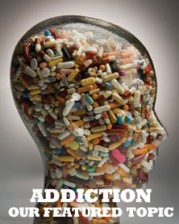 When I thought deeper about addiction – beyond drugs, alcohol, sex or food – what came to mind was our addiction to drama. Everyone knows someone who is always in the throes of some emotional drama or another. Some people just don’t feel alive unless things are out of control and they have dramatic stories to tell. Even the smallest thing like a waiter giving poor service can ruin their day. They will go on and on about it for hours and probably tell everyone not to go to that restaurant again, just for a minor infraction that gets blown way out of proportion.
When I thought deeper about addiction – beyond drugs, alcohol, sex or food – what came to mind was our addiction to drama. Everyone knows someone who is always in the throes of some emotional drama or another. Some people just don’t feel alive unless things are out of control and they have dramatic stories to tell. Even the smallest thing like a waiter giving poor service can ruin their day. They will go on and on about it for hours and probably tell everyone not to go to that restaurant again, just for a minor infraction that gets blown way out of proportion.
That is an extreme example, but we all do that kind of thing to a certain extent. We like our drama. The media saturates us with it with headlines and sound bites to make even the most benign story seem like something big. We like to have something to talk about and oftentimes we will exaggerate to make it sound more entertaining or more challenging – whatever will get us more attention at the time.
Sometimes we put a funny spin on a story, in a positive way, so we can get a good laugh out of it. But most of the time we jack the drama level up to 11 – and we don’t realize we are doing it or what we are getting out of it.
Just as watching movies or playing video games elicit chemical responses in our brains that make us feel emotions, so do the things we tell ourselves and others about our lives. Like walking down a well-worn path, our minds will take us down familiar paths that lead to some sort of gratification, even if that “gratification” is a negative outcome or emotion. By doing so, we stimulate ourselves with a rush of neuro-chemicals, in response to a positive or negative charge to the event. We become used to having that stimulation. It makes us feel something – and we often don’t take the time to realize the difference between feeling something positive or something negative.
Feeling is feeling. Stimulation is stimulation. We are sometimes like those rats that will starve themselves by pushing the button that gives them pleasure instead of the one that gives them food.
So how do we stop our destructive mental habits? Sometimes I think it starts with what a friend of mine calls “The Cold Wet Fish of Reality” hitting us upside the head. Spirit will always try to guide you gently to what is best for you. But in cases where you just aren’t able to listen, you will get smacked by that fish. It may look like the umpteenth person telling you to quit getting so upset, or another relationship breaking up for the very same reason as all the others, or just a stunning revelation while reading a book that says, “Hey, look at what you are doing!”
You may have heard it dozens of times before, but one day it just hits you hard and you start to think. That’s the fish. You start to realize a lot of your discomfort is because of your behavior and the way you react to things. You start to think perhaps there is a better way to go about your life. You start to wonder about and actively look at ways you can stop doing what you’re doing.
Changing your behavior isn’t always easy, but there are so many resources available to support you – meditation, self-healing, a spiritual practice – and lead you to a more peaceful and balanced mind. The magazine you are reading right now is a great place to start. As they say, “admitting it is the first step.” The next one is up to you.












